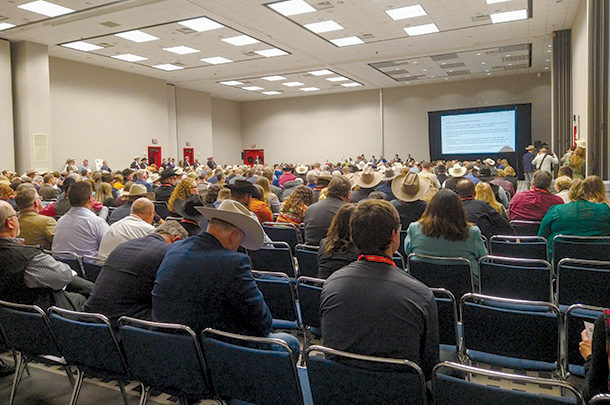Producers and state cattle organizations continued work within a key committee of the National Cattleman’s Beef Association to address major points on market transparency and price discovery.
Members of the NCBA Live Cattle Marketing Committee gathered during the 2022 industry convention in Houston to take another swing on marketing policy and how hard to push legislative efforts on cash trade mandates.
A packed conference room with state representatives, committee members and NCBA leadership, including CEO Colin Woodall, all looking on, reviewed language going into the policy.
The discussion in Houston was a continuation of the initial market transparency debate that began in July 2020 during NCBA’s summer convention in Denver. In the aftermath of the Tyson plant closure of 2019 and COVID-19 shutdowns, the committee’s six-hour meeting in Denver spelled out differences between producers on getting to the heart of price discrepancy for calves while boxed cutout values soared to unforeseen levels.
NCBA initiated an effort to monitor producer and packer participation in negotiated cash trade. Levels of participation didn’t meet a minimum threshold, which triggered a new committee discussion at Houston.
One key policy issue was whether to mandate cash market volumes. Early language proposed that if voluntary efforts did not achieve robust price discovery, resolutions from legislation – up to and including regionally tied cash trade mandates – could be adopted.
But the provision was struck down to add “NCBA opposes any mandate on cash trade volumes for cattle or any other legislative or regulatory policies that would limit the methods producers utilize to market cattle.”
Tony Toso, president of the California Cattlemen’s Association, said his organization had studied price discovery policy with a cross section of cow-calf and feeder members over the past year. But cash trade mandates pose too heavy a risk for cattle marketing. His organization joined the majority to back the amended language.
“We’ve got feeders and a few packing plants. But we’re pretty much a cow-calf producer organization,” Toso said. “And we felt strongly we’re not comfortable with that level of intrusion into our day-to-day business.”
But some key organizations from cattle-producing states, including Nebraska, Iowa, Missouri and some other states, voiced opposition to the amendment.
Pete McClymont, executive vice president of the Nebraska Cattlemen, said the anti-mandate language created issues for their organization.
“Our policy supports mandating packers to trade a researched, regionally appropriate minimum, measured on a plant-by-plant level of their weekly slaughter, the negotiated market, either negotiated flat price or negotiated grid price in the spot market, meaning zero to 14 days,” McClymont said. “So that’s where our policy was. So even though the vast majority of that policy that got amended is ours, the tweaking of the language put us in conflict with what our policy is.”
“We are full-fledged believers in the NCBA, participating all the time,” added McClymont. “This is one of those times where our policy is in conflict. The process worked; it was very respectful; it wasn’t people yelling at the top of their lungs.”
Tanner Beymer, director of government affairs and market regulatory policy, said many figures within state associations that opposed the amendment don’t necessarily favor cash trade mandates, but they do favor keeping all options on the table to boost cash trade.
NCBA’s approach, Beymer added, is to continue following the Live Marketing Committee’s suggestions that include legislative and regulatory action outside of mandates. Options include other non-mandate portions of the Fischer-Grassley bill in the Senate, contract library, Livestock Mandatory Price reporting and greater enforcement of the Packers and Stockyards Act. “All options are on the table. We just need to see what the options are from the NCBA membership as we go forward.”
“I mean, we’re all about wanting to see a level playing field,” said Toso. “We feel like there may be other areas to consider, you know, regulations and that type of thing that don’t get that intrusive, if you will. We’re working toward contract libraries; we’re working toward trying to reconcile captive supplier-committed cattle and those types of things that can have an effect.”









